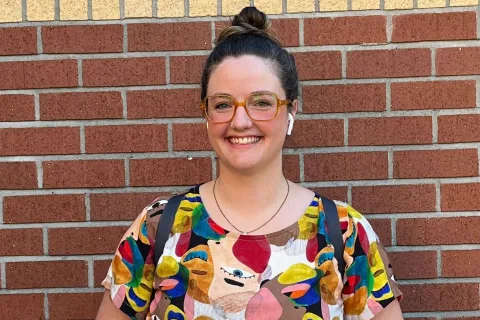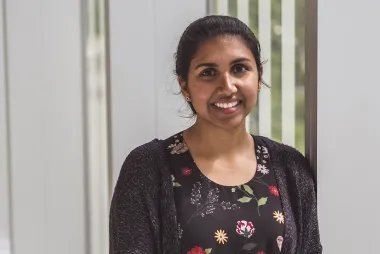"Be curious, ask questions, and spend time learning from passionate people."

Caitlin Botkin
- Degree:
- Master of Science in Nursing
- Grad year: 2024
- Program:
- Campus: Vancouver
I'm Caitlin (she/her) and I am honoured to have this opportunity to share my educational journey. I have been living, learning, playing, and raising my kids on the traditional and unceded territory of the xʷməθkwəy̓əm (Musqueam) people for the last six years. As a Dutch settler, I have lived on Turtle Island my entire life and strive to raise my children in a way that honors and respects the land we live on.
I value holding space for people's experiences and emotions and I have had the privilege to do this as both an emergency nurse and a registered midwife. I love learning in all its forms, particularly from people who are passionate about what they are teaching. I am naturally curious and communicate almost entirely in questions when I am trying to understand a concept.
I enjoy baking, gaming with my family, and I rarely show up to class without a crochet project to keep my hands busy and my brain engaged. My favourite place to be is curled up with a good book, blanket and warm drink on a rainy day, but I also love walks in the forest and along the ocean.
Why did you choose to study Nursing at UBC?
Six years ago, my family and I moved into family housing at UBC for me to pursue my midwifery degree. Going back into an undergraduate health care program after a decade of practicing as a registered nurse was an eye-opening experience. I had forgotten the span of emotions that come with clinical placements and the many factors that can influence your success. Halfway through my midwifery degree, the Covid-19 pandemic hit, further highlighting the challenges of learning in health care environments. I decided to pursue my MSN to explore how health care students are being supported in their clinical education despite workplace shortages and widespread burnout.
"I enjoyed my time at UBC and valued the university's emphasis on research. I chose to stay at UBC for my MSN because it offered in-person, full time classes and the nursing program has a great reputation. I love being part of a community that prioritizes innovation and learning, and I greatly enjoy learning from people who are doing research that is making a difference."
What has made your time at UBC memorable?
Being open to new learning opportunities changed my educational and professional trajectory. At the end of my second semester, my ethics professor, Dr. Drew Clark, asked me if I was interested in a directed study with Trans Care BC. It was in this course that I discovered a passion for research and knowledge translation. This led to me working as a nurse educator job at Trans Care BC, changing my thesis topic, and planning to begin my PhD in September.
With the support of my co-supervisors Dr. Clark and Dr. Helen Brown, I did a qualitative research study for my thesis project: Support of Lactation Induction in Transgender, Two-Spirit, and Non-Binary (TTNB) People. Completing this research was both more labour intensive and more rewarding than I anticipated. When I saw that people had actually answered my survey, I burst into tears while sitting at my computer. As I went through our findings and saw the rich and personal experiences that participants shared, I was humbled by the trust they placed in our research team. It was a pivotal moment in my professional life and I have a hard time finding the words to describe how this impacted me.
What have you learned that is most valuable?
My time at UBC has changed how I relate to the world. In the midwifery program, I witnessed another side of the health care system, one that was grounded in informed choice and individual values. Through interactions with clients, fellow students, preceptors, and faculty, I began to question previously held assumptions. I embraced a relational and individualized approach to care, grounded in principles of decolonization and intersectionality. The faculty in the MSN program supported me to refine these principles into the theoretical positioning that underpins my work and research.
I have always been curious and I love learning new things. My time in the MSN program ignited this passion and gave me space and time to immerse myself in learning. I developed new research skills and became a much stronger writer by exploring the same concepts in multiple classes. Receiving feedback from different faculty helped me develop a writing style that incorporates my own style and is appropriate for the audience I am writing for, whether that audience is academic or clinical.
What advice would you give a student entering your degree program?
Most people in this program will also be working in a clinical setting. This brings richness to the conversations in the classroom and a personal challenge as you try to balance both school and work. Give yourself grace as you adjust into the program, and know that everyone else is probably feeling some level of overwhelmed and exhausted as well.
Get to know your people. The first year of the full time program is a cohort, so you will do the core classes in the first two semesters with the same students. I loved this as it helped me form relationships with other students and feel grounded in the program. The time we spent together and the familiarity we formed made the transition into grad school less overwhelming.
Take your time to select a supervisor and make a plan for your grad project. Ask lots of questions and be curious about your opportunities. Every faculty member I reached out to was encouraging and open to discussing their research and opportunities for student involvement. Be clear about what your educational goals are and don't be afraid to ask for help or advice when you need it.
Where do you find your inspiration for using your degree to make an impact?
There are so many people at UBC who have encouraged my curiosity and shaped my education. In the midwifery program, Dr. Luba Butska's support and encouragement made a key difference in me completing the program. My thesis supervisory committee of Drs. Clark, Brown, and Emily Jenkins encouraged me, gave me constructive feedback when I lost the plot, and had endless patience with shifting due dates. My writing is so much stronger as a result of their involvement. And the conversations I had with Dr. Nassim Adhami about clinical education gave me a framework for how I want to teach and practice in the future.
My current work at Trans Care BC is driven by the stories TTNB parents share about exclusion and unmet care needs. Using my academic and clinical expertise, I can honour these stories, creating resources that will help both TTNB parents and the clinicians that care for them. By translating the research into clinical documents, I can help create something that makes a tangible difference in people's lives.
What are some contributions you would like to make when it comes to the future of work in your field?
As I move into my PhD, I am excited to continue to work with my supervisors to explore the topics that brought me into the MSN program—health care education in the context of staffing shortages, burnout and moral distress. I hope to explore other styles of research and I'm intrigued by the idea of using a mixed methods design in my next research project.
Through my ongoing work at Trans Care BC, I will continue to focus on the resource needs identified by TTNB parents and the clinicians that support them. I want to look back on the work I was involved in and be proud of what we have created and see that it has had a positive impact.
In my time at UBC, I have had the privilege of learning from amazing people and taking part in projects that intrigue me. My life today does not look anything like I expected it to when I moved to UBC, but it has been an adventure and I am looking forward to the next stage.




